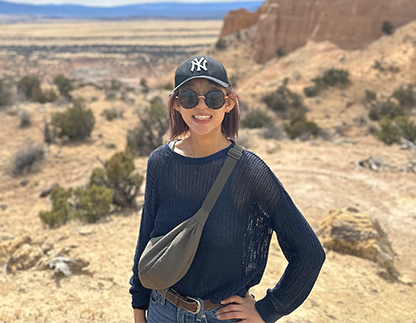In the broadest sense, I study women revolutionaries who challenged what politics could be.”
Amanda Ziyi Fu
PhD Candidate in the Department of Political Science

Amanda Ziyi Fu is a PhD candidate in the Department of Political Science in the Weinberg College of Arts and Sciences. She currently studies early 1900s East Asian women who challenged imperialism by turning relationships, marriage, and family into building blocks for political change.
How would you describe your research and/or work to a non-academic audience?
In the broadest sense, I study women revolutionaries who challenged what politics could be. I focus on East Asia in the early twentieth century, when Chinese thinkers and activists were grappling with a big question: how do we modernize without losing cultural or national autonomy?
Many women approached this question differently: if we aren't loyal first and foremost to a patriarchal nation, then what kind of future are we fighting for? Often, their answers predicated political revolutions to the institutions of everyday life—sexuality, marriage, and the family. These women reimagined intimacy as a site of political change, decolonization, and liberation.
Hopefully, I show that they provide so much for us to rethink our contemporary post-sexual liberation moment, that the fantasies of personal fulfillment and individual autonomy haven't gotten us very far.
What have been some of the most memorable twists and turns of your career?
I majored in political science and German studies in college. When I applied to grad school, it felt like a real loss to let go of German literature and film, but I ultimately decided my passion lay in political theory.
As it turns out, my dissertation has brought me back through many twists and turns to literature, but this time in my cultural roots in the Chinese-speaking world. One of my chapters focuses on Xiao Hong, a Chinese anti-colonial novelist, whom I read as a thinker of sexual liberation and colonialism. So eventually, I’m still thinking about politics, but now through the lens of language, imagination, and acts of everyday life.
Tell us what inspired your research and/or work.
I am a feminist theorist first and foremost, yet I had always felt a sense of disconnect with the North American focused canon of feminist theory. At the same time, I didn't fully relate to much of postcolonial theory as they tended to spotlight a few male nationalist elites and their sweeping visions at the level of nation-states.
Discovering the anarchist thinker He-Yin Zhen was exhilarating—from more than a century ago, she was already moving fluidly between allegiances, to Chinese decolonization, to socioeconomic revolution, but also to women as a global community. That was when I decided to focus on women in the anti-colonial period, who like me were caught in many “betweens” but refused to make either-or choices.
Whom do you admire in your field and otherwise, and why?
I could answer Hannah Arendt, who thought and wrote so piercingly, always confronting the massive tragedies and catastrophes of her time head-on. She turned political theory into a demand of honesty and conscience. I could also answer Angela Davis, bell hooks, Nancy Fraser, Sara Ahmed, and many others, who weren't afraid of being killjoys, of calling out colleagues and traditions for white-streaming feminism or de-gendering Marxism.
But honestly, I would have to answer my own colleagues—my mentors and fellow graduate students. They are all producing fabulous research at a time when a career in humanities is increasingly uncertain. But somehow, they still find the time to build deeply fulfilling lives as people. They always show up to offer their wisdom, support, and guidance when I need it, no matter how many other things they have to juggle.
How do you unwind after a long day?
Nothing fills me with more joy than cooking. It never feels like a chore, but simply a miracle every day how the same vegetables and fruit can turn into so many different delicious meals. I love experimenting with new spices, cooking methods, and recipes from around the world. And I love being able to feed my friends and see how my labor can fill them with joy, too.
What books are on your bedside table?
I am currently reading Gabriel García Márquez's The Autumn of the Patriarch. My next goal is the Mesopotamian mythology, Epic of Gilgamesh. My favorite read of the year so far is You Dreamed Of Empires by Álvaro Enrigue. Right now, my favorite author is Elena Ferrante, but ask me again and it might change.
Publish Date: August 12, 2025
If you know a graduate student, postdoctoral scholar, graduate faculty member, staff member, or a member of our TGS alumni population who would make a great candidate for our TGS Spotlight Series, please complete this brief TGS Spotlight Series Nomination Form.